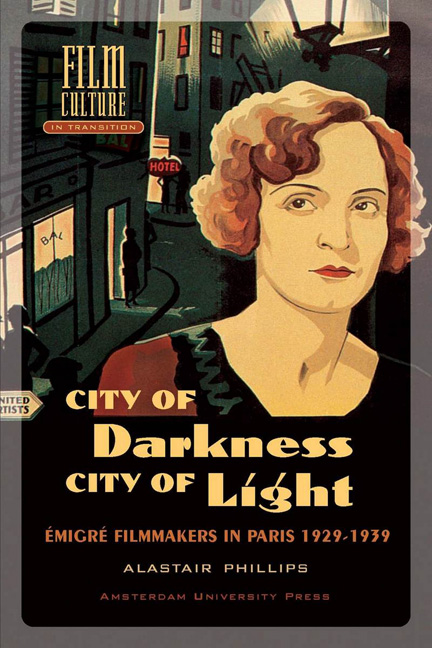Book contents
- Frontmmatter
- Contents
- Acknowledgements
- Chapter One Introduction
- Chapter Two The City in Context: An Historical Ambivalence
- Chapter Three City of Light: Paris as Spectacle
- Chapter Four City of Darkness: The Camera Goes Down the Streets: ‘The Hidden Spirit Under the Familiar Façade’
- Chapter Five Divided City: The Divided City in Context
- Chapter Six Conclusion
- Notes
- Appendices
- Filmography
- Bibliography
- Index
- Film Culture in Transition General Editor: Thomas Elsaesser
Chapter Six - Conclusion
Published online by Cambridge University Press: 25 January 2021
- Frontmmatter
- Contents
- Acknowledgements
- Chapter One Introduction
- Chapter Two The City in Context: An Historical Ambivalence
- Chapter Three City of Light: Paris as Spectacle
- Chapter Four City of Darkness: The Camera Goes Down the Streets: ‘The Hidden Spirit Under the Familiar Façade’
- Chapter Five Divided City: The Divided City in Context
- Chapter Six Conclusion
- Notes
- Appendices
- Filmography
- Bibliography
- Index
- Film Culture in Transition General Editor: Thomas Elsaesser
Summary
The French film journalist Henri Calef, in a 1933 interview with the émigré director Kurt Bernhardt, observed that “the cinema is an excellent vehicle for the intensification of relations between two nations – it permits not only a richer mutual knowledge but also a greater mutual understanding”. Calef's utopian ideals were apparently akin to those of the future director of Carrefour who, in another meeting with the Parisian press, argued that the presence of foreign filmmakers in France “was the only means by which to achieve an international cinema”. This book has examined what happened to these aspirations in relation to a number of different émigré filmmakers’ encounters with the French capital in the 1930s. Some, like Fritz Lang and BillyWilder, stayed but briefly, their eyes firmly fixed on the next stage of their journey: the United States. Others stayed longer. Bernhardt himself turned down an offer by Hollywood's Columbia Studios in 1936, preferring to remain, for the time being, in Europe. Filmmakers like Robert Siodmak and Victor Trivas worked in France for the rest of the decade with varying degrees of professional and financial success. Whilst Siodmak eventually directed a number of features, Trivas made but one film and spent the rest of the 1930s fitfully engaged in various scriptwriting opportunities before narrowly evading arrest by moving to the South of France.
The arrival in Paris of various film personnel from the studios of Berlin must be seen within the context of a complex history of travel and exchange between France and Germany. This history was framed by a pattern of ambivalence which in turn informed the way that the two countries’ respective film industries tilted between mutual rivalry and mutual concern as they both responded to the increasingly hegemonic position of the United States in the world film market. The city was an important location from which to understand this process; not least because of the significant fact that each country's capital had long been central to dominant definitions of national cinema in terms of production, exhibition and representation. As Siegfried Kracauer observed, contemporary cinema in the post-FirstWorldWar period had a particular affinity for the contingent aspects of urban life.
- Type
- Chapter
- Information
- City of Darkness, City of LightÉmigré Filmmakers in Paris 1929–1939, pp. 171 - 176Publisher: Amsterdam University PressPrint publication year: 2003



